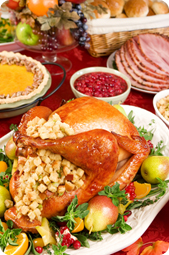Holiday Food Safety Tips
Protect your family and friends from food poisoning this festive season by preparing food properly.

Turkey
Store your Turkey in Fridge/Freezer Right Away
When you arrive home from the grocery store, store your turkey in the fridge or freezer immediately.
Keep the turkey in its original packaging at the bottom of the fridge in a clean container big enough to hold it. This prevents leaking juices from contaminating other foods stored in your fridge.
Thawing a Turkey
Never thaw a turkey at room temperature.
Start thawing a frozen turkey in your fridge several days before roasting. Allow 24 hours of defrosting time for each 2.5 kg (5 pounds) of turkey.
Turkey can be defrosted under cold, drinkable water, but it should be wrapped in leak proof plastic to prevent cross contamination.
For frozen, pre-stuffed turkeys, follow instructions on the label.
Clean Hands/Surfaces Before and After Preparing a Turkey
Wash your hands, all counters and utensils before and after preparing the turkey. Surfaces and utensils can be sanitized with a mild bleach solution of 1 tsp. of bleach with 3 cups of water for 45 seconds. Rinse with clean water.
Rinsing the turkey prior to cooking is not recommended.
Stuffing a Turkey
It is safest to cook the stuffing outside of the turkey.
If you decide to stuff the turkey, stuff it just before placing in the oven.
The temperature of the stuffing should reach a minimum temperature of 74°C. (165°F)
Remove stuffing from turkey immediately after cooking. The stuffing should be served immediately, kept hot at 60°C or refrigerated.
Cooking a Turkey
Use a thermometer to make sure that the turkey is cooked to a safe temperature.
Take the temperature in the thickest part of the breast or thigh meat and make sure the thermometer is not touching any bone.

If using an oven safe thermometer, place the thermometer in the thigh muscle being sure to not touch the bone and pointing towards the body.
The turkey is safe to eat once the temperature reaches 82°C (180°F).
Do not cook the turkey in a slow cooker or overnight at an oven temperature lower that 177°C (350°F).
Cook fresh turkey within two days of purchasing it from the store.
Serving Turkey and Leftovers
Serve the turkey immediately, refrigerate or keep hot at a temperature of 60°C or more.
Do not let the turkey sit out at room temperature for more than 2 hours. Refrigerate leftovers within two hours to minimize the chance of bacteria growing.
Cooked turkey, stuffing, gravy and other cooked dishes should be eaten within 2 days or frozen right away. Reheat leftovers to at least 74°C (165°F). Bring gravy to a full, rolling boil.
Eggnog
Store-bought eggnog is pasteurized and does not require heating to kill harmful bacteria.
Homemade eggnog can be unsafe to consume if it is made with raw or partially cooked eggs as salmonella can be present.
If you are making eggnog at home, you should:
- Use pasteurized egg and milk ingredients, available in many grocery stores, or
- Heat the egg-milk mixture to at least 71°C (160°F) and then refrigerate in small amounts using shallow containers so it will cool quickly.
Buffets
Food that sits out for long periods of time in the temperature danger zone, (the temperature at which harmful bacteria are most likely to grow) can pose a food safety hazard.
Keep cold foods at temperatures at or below 4°C (40°F) and hot foods at 60°C (140°F) or higher.
To prevent food poisoning at buffets:
- Use warming trays, chafing dishes or crock pots to keep hot foods at temperatures above 60°C (140°F)
- Place crushed ice under cold foods and keep at or below 4°C (40°F)
- Do not let foods sit out at room temperature for more than 2 hours
Baked Goods
Raw eggs can contain Salmonella bacteria.
Be sure that no one eats uncooked cookie dough, batters or frostings made with raw eggs. It may be tempting to let the kids "lick the spoon", but batters with raw eggs can pose a serious food safety risk.
Source: Health Canada and Eat Right Ontario





